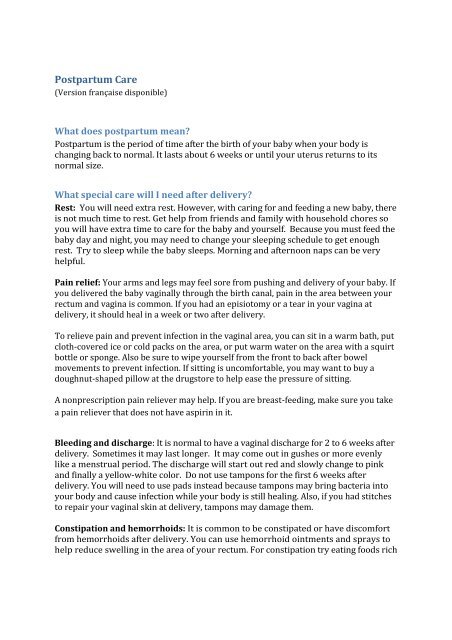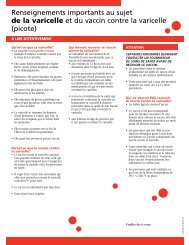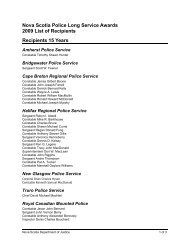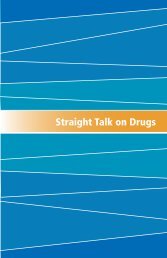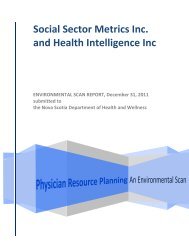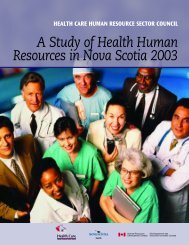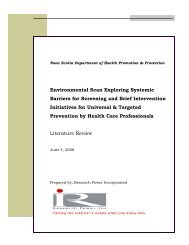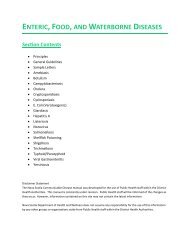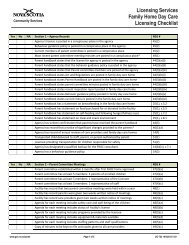Postpartum Care.pdf - 811
Postpartum Care.pdf - 811
Postpartum Care.pdf - 811
You also want an ePaper? Increase the reach of your titles
YUMPU automatically turns print PDFs into web optimized ePapers that Google loves.
<strong>Postpartum</strong> <strong>Care</strong><br />
(Version française disponible)<br />
What does postpartum mean<br />
<strong>Postpartum</strong> is the period of time after the birth of your baby when your body is<br />
changing back to normal. It lasts about 6 weeks or until your uterus returns to its<br />
normal size.<br />
What special care will I need after delivery<br />
Rest: You will need extra rest. However, with caring for and feeding a new baby, there<br />
is not much time to rest. Get help from friends and family with household chores so<br />
you will have extra time to care for the baby and yourself. Because you must feed the<br />
baby day and night, you may need to change your sleeping schedule to get enough<br />
rest. Try to sleep while the baby sleeps. Morning and afternoon naps can be very<br />
helpful.<br />
Pain relief: Your arms and legs may feel sore from pushing and delivery of your baby. If<br />
you delivered the baby vaginally through the birth canal, pain in the area between your<br />
rectum and vagina is common. If you had an episiotomy or a tear in your vagina at<br />
delivery, it should heal in a week or two after delivery.<br />
To relieve pain and prevent infection in the vaginal area, you can sit in a warm bath, put<br />
cloth-covered ice or cold packs on the area, or put warm water on the area with a squirt<br />
bottle or sponge. Also be sure to wipe yourself from the front to back after bowel<br />
movements to prevent infection. If sitting is uncomfortable, you may want to buy a<br />
doughnut-shaped pillow at the drugstore to help ease the pressure of sitting.<br />
A nonprescription pain reliever may help. If you are breast-feeding, make sure you take<br />
a pain reliever that does not have aspirin in it.<br />
Bleeding and discharge: It is normal to have a vaginal discharge for 2 to 6 weeks after<br />
delivery. Sometimes it may last longer. It may come out in gushes or more evenly<br />
like a menstrual period. The discharge will start out red and slowly change to pink<br />
and finally a yellow-white color. Do not use tampons for the first 6 weeks after<br />
delivery. You will need to use pads instead because tampons may bring bacteria into<br />
your body and cause infection while your body is still healing. Also, if you had stitches<br />
to repair your vaginal skin at delivery, tampons may damage them.<br />
Constipation and hemorrhoids: It is common to be constipated or have discomfort<br />
from hemorrhoids after delivery. You can use hemorrhoid ointments and sprays to<br />
help reduce swelling in the area of your rectum. For constipation try eating foods rich
in fiber. Do not use any medicines to loosen your bowel movements without first<br />
asking your healthcare provider.<br />
Urination: In the first days after delivery you may notice a change in your usual pattern<br />
of urination. During the first 72 hours your kidneys work harder than usual to get rid of<br />
any extra fluid that built up in the body during pregnancy. Your bladder may be swollen<br />
and bruised. This can lead to temporary problems with sensing bladder fullness and can<br />
make it harder to empty your bladder completely. To help prevent bladder infections,<br />
practice good hygiene and wipe from front to back after urination and bowel<br />
movements. Try to drink plenty of fluids, especially water or cranberry juice. Make<br />
regular urination a habit and avoid long waits between the times you empty your<br />
bladder. If you are having trouble controlling your bladder, or if you have burning,<br />
lower abdominal pain, back pain, or fever, tell your healthcare provider.<br />
Breast soreness: Your milk will come in about 2 to 4 days after your child is born. This<br />
may make your breasts very large, hard, and sore.<br />
If you are breastfeeding, this will get better once you start a breast-feeding<br />
routine.<br />
If you are not breast-feeding, your breasts may become large or painful<br />
while you are waiting for your milk to dry up. To help with pain and<br />
discomfort while you wait, wear a well-fitting support bra, and put ice<br />
packs on your breasts, and do not stimulate the nipples.<br />
Headaches: Many women have headaches during the first few weeks after delivering<br />
their baby. Most of the time, these are tension headaches. Try to get plenty of rest when<br />
you can. Be sure to eat meals on a regular schedule. Try to avoid drinks that have a lot of<br />
caffeine. You may get some relief by lying down with a cool damp cloth on your<br />
forehead, using relaxation techniques such as meditation, or taking nonprescription<br />
pain medicines such as acetaminophen. (If you are breastfeeding, check with your<br />
healthcare provider before taking any medicines.) If your headache is severe or if you<br />
have changes in your eyesight such as trouble focusing or blurred vision, nausea,<br />
vomiting, or weakness in any part of your body, tell your healthcare provider right<br />
away.<br />
When can I start doing normal activities<br />
If you had a normal delivery without any problems, you can get back to doing most<br />
of your normal activities right away. Try to avoid heavy lifting, vacuuming, and a lot<br />
of stair climbing for the first couple of weeks. If you have had a C-section, you will need<br />
to avoid heavy lifting for 6 weeks or as long as instructed by your healthcare provider.
Exercise is one of the best ways to lose weight, get more energy, relieve stress, and<br />
build your strength. Unless you had a C-section, difficult birth, or other pregnancy<br />
problem, you can usually start exercising as soon as you feel up to it. If you have had<br />
a C-section, you can usually start exercising in 6 weeks or when your healthcare<br />
provider says it is OK.<br />
When will my period start again<br />
If you are not breast-feeding your baby, you may start having menstrual periods 3 to<br />
10 weeks after delivery. If you are breast-feeding, there is no specific time when your<br />
periods will start again. It may not happen until after the first 6 months of breastfeeding,<br />
but it could happen earlier. Some women do not get their period again until<br />
they stop breast-feeding.<br />
When will I return to my normal weight<br />
During birth, you lose about 12 to 14 pounds. However, this may still leave some<br />
weight to lose, depending on how much weight you gained during pregnancy.<br />
Losing this weight takes time. It takes most moms 8 to 12 months to return to their<br />
normal weight. Losing the weight slowly is healthy and natural. The key is to eat<br />
healthy and exercise. After the first few months of eating right and exercising, you<br />
can begin a healthy weight-loss program if necessary. If you are breast-feeding, you<br />
should make sure you are still eating at least 1800 calories a day. Because breastfeeding<br />
uses a lot of calories, it usually helps women lose their pregnancy weight.<br />
When can I have sex again<br />
The number of weeks you should wait before having sex depends on your specific<br />
situation. If you had an episiotomy, you should wait at least 3 to 4 weeks for it to heal.<br />
If you had a C-section you should wait at least 4 weeks so your cuts can heal.<br />
Because it takes about 6 weeks for your uterus to get back to its normal size, many<br />
providers recommend that all moms wait a full 6 weeks. It is normal to feel<br />
uncomfortable at first when you start having sex again after childbirth, especially if<br />
you are breastfeeding.<br />
Talk to your provider about methods of birth control you can use after the birth of<br />
your baby. The method that may be best for you depends on the type of delivery you<br />
had, how you are recovering, and if you are breast-feeding. Remember that you can<br />
get pregnant before you start having periods again.<br />
What are the postpartum blues<br />
Many physical and emotional changes happen when you are pregnant and after you<br />
give birth. These changes can leave you feeling sad, anxious, afraid, or confused.<br />
These feelings are called the baby blues and usually start right after the baby is born<br />
and go away within a week. However, for some women, these feelings do not go away
and they may get worse. When this happens it is called postpartum depression.<br />
<strong>Postpartum</strong> depression can start right after the baby is born or begin weeks later.<br />
It can be a serious problem and needs treatment. If you feel depressed, talk to your<br />
healthcare provider.<br />
When do I need to see my health care provider for a checkup<br />
Your provider will tell you when you need to return for a checkup. For a normal<br />
delivery, it is usually 4 to 6 weeks. If you had a C-section, your provider will want to<br />
see you 1 to 2 weeks after the birth of your baby and again at 6 weeks after the birth.<br />
A follow-up appointment may be scheduled sooner if there were any problems<br />
during your pregnancy, such as high blood pressure or diabetes.<br />
When should I call my health care provider<br />
Call your provider if:<br />
You have a fever over 38° C (100.4° F).<br />
You have unusual abdominal or genital pain.<br />
You have increased pain, swelling, redness, or discharge from an episiotomy or C-<br />
section cuts.<br />
You are bleeding through more than 1 pad per hour.<br />
The discharge from your vagina smells bad or you have itching.<br />
You pass blood clots the size of a plum or larger.<br />
Your breasts are red or warm, or there is an unusual discharge from the nipples.<br />
You are unable to empty your bladder, or you feel a burning pain when you<br />
urinate.<br />
You have pain in one of your legs when you walk.<br />
Your legs are tender or red.<br />
You have felt depressed or blue for more than 2 to 3 days.<br />
You should get more detailed information and instructions about these possible<br />
problems when you leave the hospital after the birth of your baby.<br />
Developed by McKesson Provider Technologies.
Published by McKesson Provider Technologies.<br />
Copyright © 2006 McKesson Corporation and/or one of its subsidiaries. All Rights<br />
Reserved.<br />
This content is reviewed periodically and is subject to change as new health<br />
information becomes available. The information is intended to inform and educate and<br />
is not a replacement for medical evaluation, advice, diagnosis or treatment by a<br />
healthcare professional.<br />
Nova Scotia Telecare, Reviewed by Clinical Services Working group, June 2013<br />
52671 <strong>Postpartum</strong> <strong>Care</strong>


